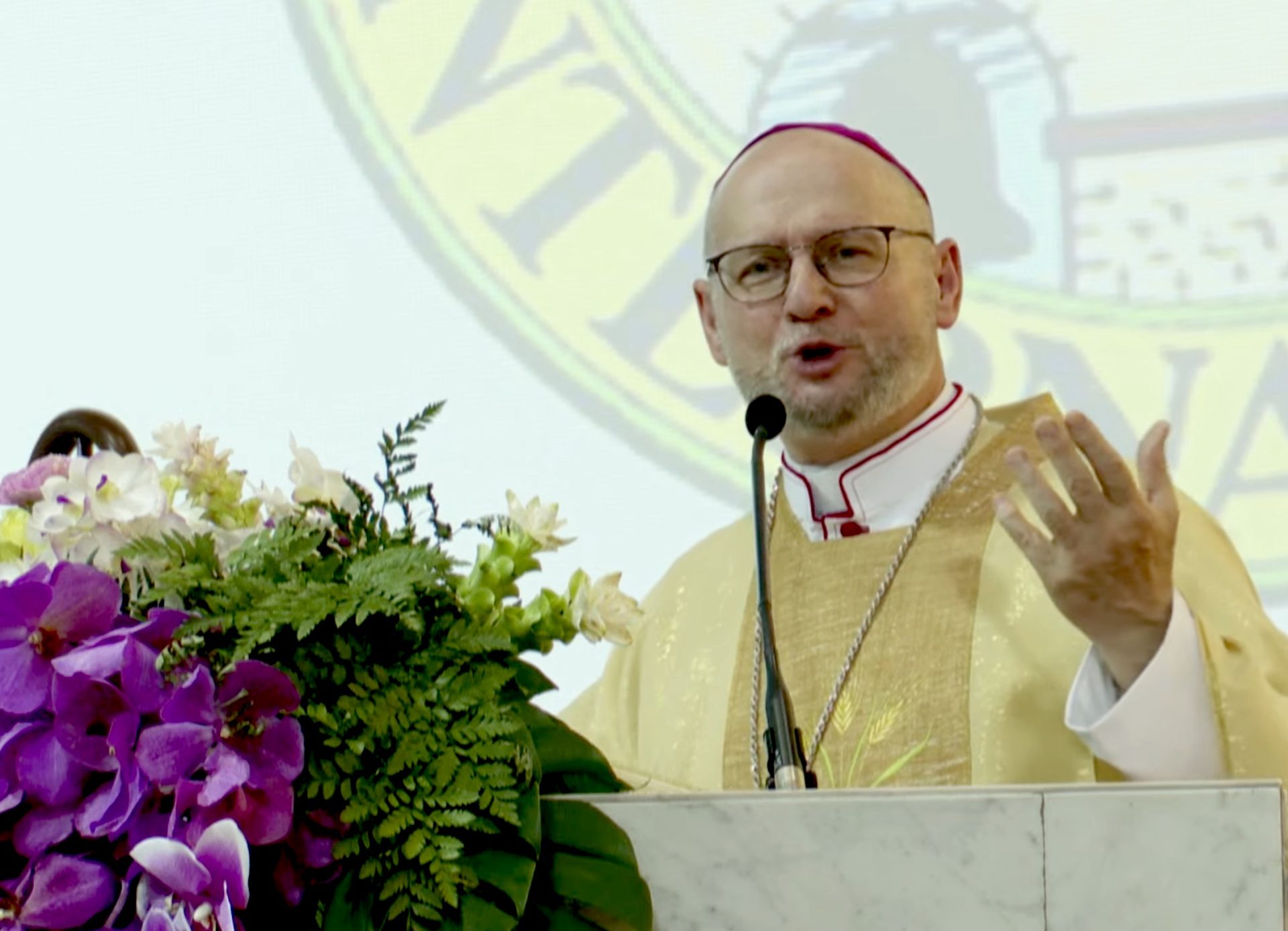The Catholic Church has always played a significant role in shaping the moral and spiritual fabric of societies around the world. I don’t believe I have ever seen a more pertinent example of this than what I have witnessed in these months in this country. Although the Church is a minuscule minority, its impact on social society here is extraordinary. As we say in boxing “ the Church here punches much above its weight”. You, Brother Bishops, as the spiritual leaders of your respective dioceses, carry the responsibility of guiding your flocks in faith, promoting the teachings of the Church, and addressing the challenges that arise in the modern world. In this region, Bishops face unique challenges that require your attention and a strategic approach.
Now here I talk about a “strategic approach”. In a world dominated by business and strategic plans I hesitate to use this term, but I think the word “strategic” is very applicable in our context today. As a Church, we can no longer rest on our laurels or remain complacent and reactive. We can no longer be a “caretaker Church” but we must be an evangelical reality. This requires that we are proactive, energetic, action based and develop a “strategy” contextualized by Gospel imperatives. “Sa bai, sa bai” and “mai pen lai”, just don’t work in the ecclesial context.
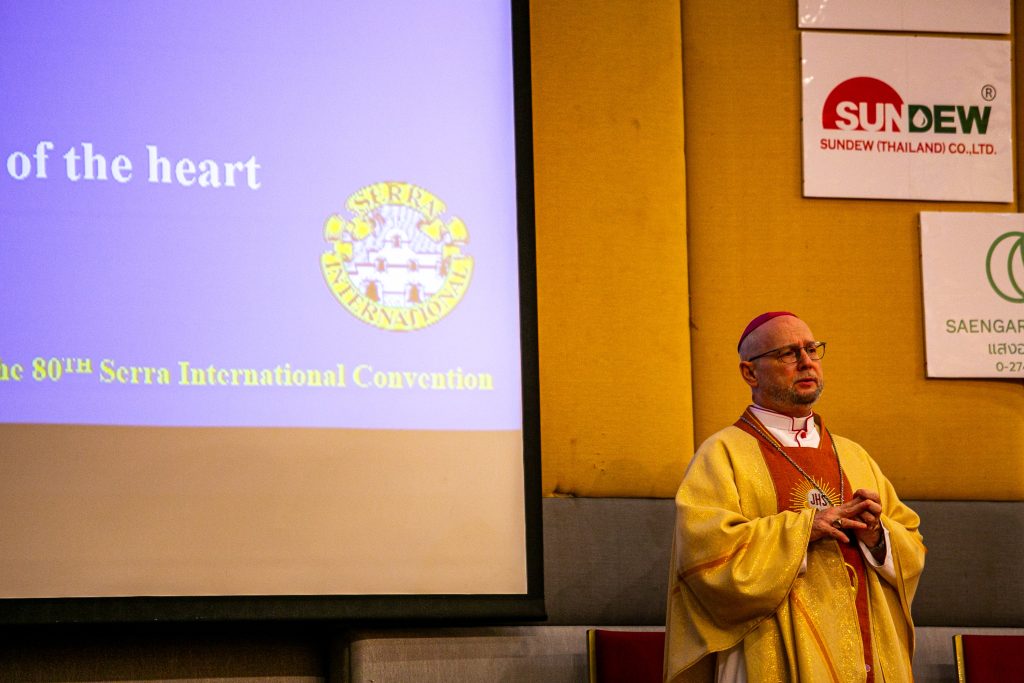
As you are aware one of the significant challenge that we face in this region is religious pluralism and the urgent need for interfaith dialogue. Our region is known for its rich and diverse religious landscape, with followers of various faiths living side by side. It is crucial for us, as representatives of the Catholic Church, to foster harmonious relationships with followers of other religions in order to build bridges of understanding and create a more peaceful and inclusive society.
Let us take Thailand as an example, where Catholics represent an extreme minority in a predominantly Buddhist country. In such a context, it becomes even more vital for the Church to actively engage in interfaith dialogue and promote mutual respect and understanding. We cannot afford to live in isolation or to see our differences as barriers. Instead, we must recognize the value of open conversations that allow us to learn from one another, appreciate different religious traditions, and seek common ground for collaboration. Since my arrival, I have had numerous opportunities to meet many Buddhist leaders. In fact, a group of young monks recently visited the Nunciature. I have been touched by their kindness, respect and admiration for Catholics and for the Church here in Thailand. For me this says much about the bishops, your witness and your commitment to inter-religious dialogue.
Interfaith dialogue provides us with an opportunity to cultivate relationships based on respect and empathy. Through these dialogues, we can deepen our understanding of different religious beliefs, practices, and values. By listening to one another, we can break down stereotypes and misconceptions that often lead to fear and mistrust, which was a major problem even in the recent past. In doing so, we can promote harmony and build bridges of understanding between communities.
Moreover, interfaith dialogue is no longer about recognizing our differences; it is about discovering shared goals and aspirations. In fact, for years highlighting differences was the major emphasis in much of our dialogue. I think Pope Francis, to a large degree, must be credited with changing this posture (cfr. Fratelli tutti). As people of faith, we all share a common desire for justice, compassion, and peace. By coming together and working collaboratively, we can address social issues such as poverty, inequality, and environmental degradation. By combining our efforts, we can amplify our impact and create a more just and sustainable world for all.

Through interfaith dialogue, Catholic bishops have the power to inspire and lead. By actively engaging with followers of other religions, we can demonstrate our commitment to mutual understanding and respect. We can encourage our communities to embrace diversity as a strength rather than a source of division. By fostering a spirit of unity among diverse religious communities, we can set an example for others and contribute to the building of a more harmonious society.
Another area of major concern which, as Christians must be first and foremost for us, is social and economic inequalities and the vital role we, as Bishops in Thailand, have in advocating for human rights. We stand at a pivotal moment in history, where our actions can make a profound difference in the lives of our people, especially those who suffer from poverty, exploitation, trafficking and injustice. Sometimes it is easy for us to fall into the trap, believing that our actions really have a little impact on the world. This is not true. Often in history it has taken only one person, and one small act of love to change the course of history itself.
As Pope Francis has reminded us, we are called to stand with the poor and the exploited. In Thailand, social injustice and inequality are deeply rooted, and they lie at the heart of many of this country’s challenges. While some regions, like Bangkok and the Center, have experienced positive economic growth, other areas, such as the Northeast, have been left behind. This growing wealth gap has resulted, at times, in a lack of access to essential services, including education, healthcare, and basic necessities.
As leaders of the Catholic Church in Thailand, we bear a moral obligation to speak out against these injustices and work tirelessly towards a more just and equitable society. This necessitates advocating for policies that uphold and protect human rights, including access to quality education, healthcare, and decent work. Moreover, it requires us to address the root causes of poverty and inequality, such as corruption and discrimination.
I implore you, dear Brother Bishops, to use your influential voice and position to effect positive change in the lives of our people. This may entail challenging powerful interests or questioning the status quo. However, as Pope Francis has reminded us, the Gospel is not a museum of memories but a living source of grace and life. We must be willing to take risks and boldly stand up for what is right, even when it seems difficult or unpopular.
In this regard I wish to express my sincere gratitude for your leadership and unwavering commitment to social justice. Together with our Catholic community, we can make a profound impact on the lives of the most vulnerable members of our society. Let us join hands and work tirelessly towards a more just and equitable world, where every person is treated with dignity, respect, and compassion, and may our actions be guided by the teachings of Christ and the wisdom of the Holy Spirit.
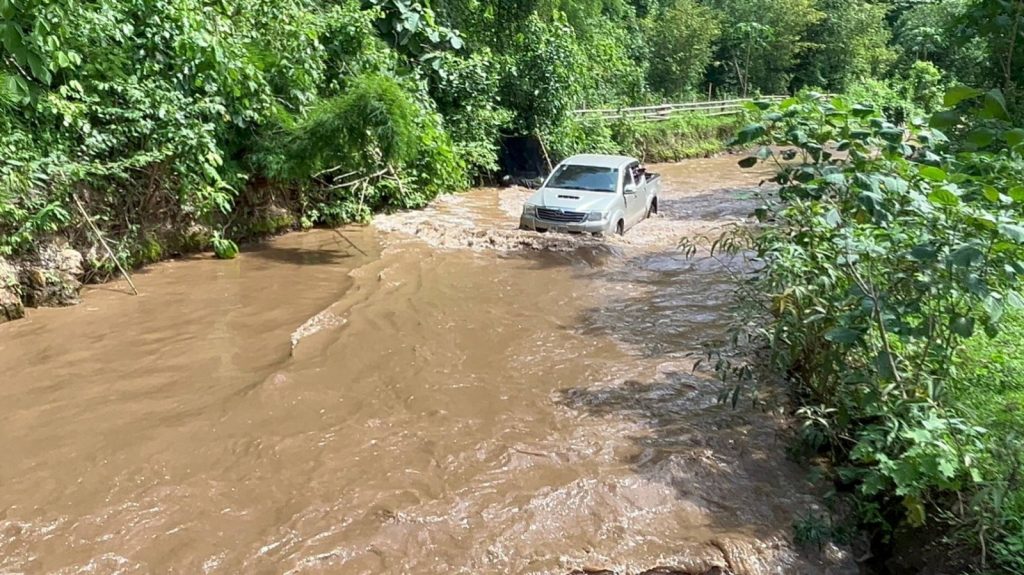
Another significant challenge we are facing is environmental degradation and climate change. As stewards of creation, it is our sacred duty to actively promote environmental stewardship and sustainable practices within our communities.
Thailand, as a region, is highly vulnerable to the adverse impacts of climate change. Rising sea levels, extreme weather events, and deforestation pose significant threats to our environment, economy, and the well-being of our people. In this region, even our food security is at risk due to the threats to rice production. We cannot turn a blind eye to these challenges but must rise to the occasion and take proactive measures to safeguard our shared home.
As Pope Francis bluntly stated, “The earth, our home, is beginning to look more and more like an immense pile of filth.” We cannot ignore the moral imperative to act and protect our common home. The Catholic Church, globally, has recognized this urgency, with bishops worldwide acknowledging that climate change is a moral issue for people of faith and goodwill. Teaching on the environment has become more than just a good and ethical thing for us to do. It has become a matter of doctrine, and it is thus imperative that it be preached and taught.
In the United States, the Catholic bishops adopted an unprecedented statement titled “Global Climate Change: A Plea for Dialogue, Prudence and the Common Good.” It emphasizes that caring for our environment is an ethical duty that extends to all people. Likewise, the German Bishops have affirmed that environmental problems affect everyone, regardless of social status, but that the most vulnerable are often the hardest hit.
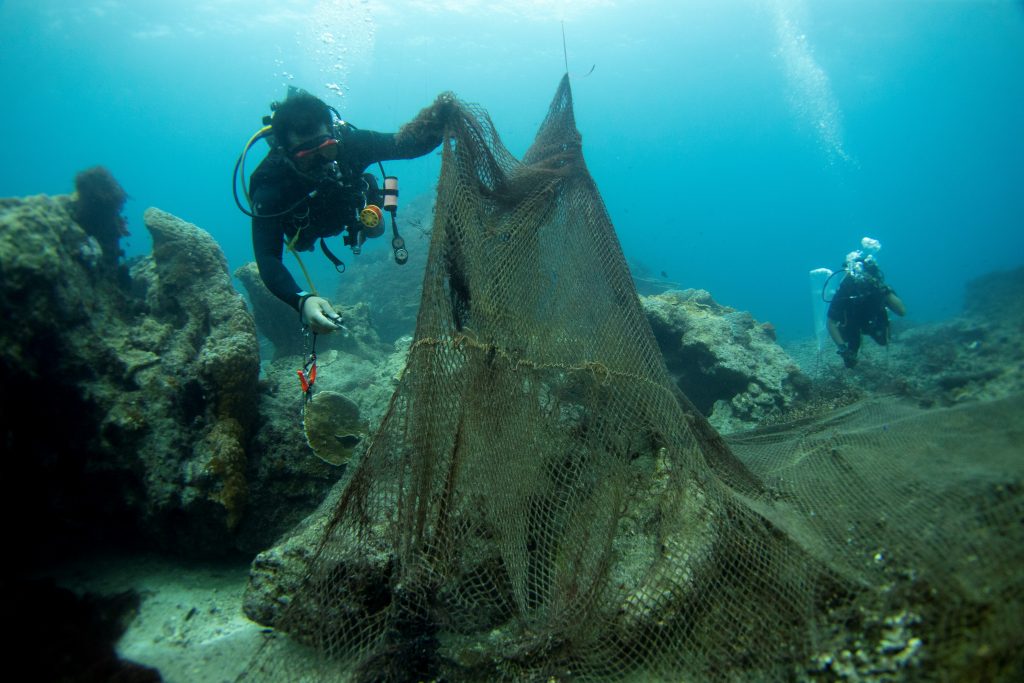
We must embrace our role as stewards of God’s creation and exercise restraint and moderation in the use of material goods. Our desire to consume must not overshadow our concern for the poor, the youth, and the integrity of creation itself. Our natural resources are limited and not inexhaustible. Therefore, we have a responsibility to safeguard and protect them.
To address these challenges, let us actively work to raise awareness within our communities about the urgency of environmental stewardship. We must educate our congregations about the impacts of climate change and inspire them to adopt lifestyles that respect and protect the environment. By incorporating eco-friendly practices into our daily lives, such as conserving energy, reducing waste, and promoting sustainable agriculture, we can make a tangible difference. I was recently invited to participate in the St. Francis of Assisi (Laudato si ) Awards. It is a wonderful Thai Catholic initiative and exactly the type of thing the Church throughout the world should be promoting.
Let us also continue to work with environmental organizations, academic institutions, and local communities to implement initiatives that promote environmental sustainability. By leveraging our collective wisdom and resources, we can initiate projects that protect biodiversity, restore ecosystems, and mitigate the impacts of climate change. We have an unusual opportunity here since we have so many top level academic institution. A mandatory curriculum on environmental protection and advocacy taught from kindergarten to university with Laudat si as its basis would an extraordinary initiative.
As leaders of the Church in Thailand, we have a unique opportunity to lead by example and inspire our communities to be environmental stewards. Let us heed Pope Francis’ call to be protectors of creation, protectors of God’s plan inscribed in nature, and protectors of one another. By embracing our role as custodians of the environment, we can create a sustainable future for generations to come.
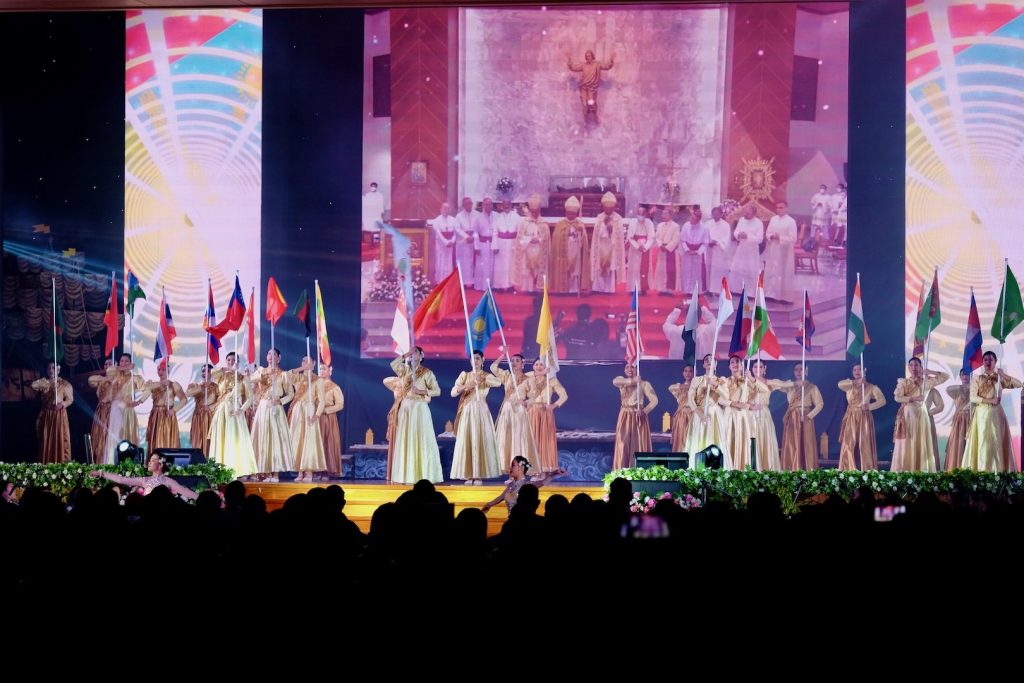
In conclusion, I am honored to have the opportunity to address for the first time the wonderful Bishops of Thailand. I have been so impressed over the last months by your dedication and tireless efforts in caring for your flocks and promoting the teachings of the Catholic Church. As we navigate the challenges of religious pluralism, social and economic inequality, political uncertainty, religious ambivalence, and environmental degradation, let us remember that we are not alone. The Holy Spirit is with us, guiding and empowering us to make a difference in the lives of our communities.
Dear Brother Bishops, may you continue to be steadfast in your commitment to the Gospel and may your leadership inspire others to follow in your footsteps. Through your unwavering faith, compassion, and strategic approach, I am confident that you will overcome these challenges and lead your flocks towards a brighter future.
May the love and guidance of our Lord Jesus Christ be with you as you embark on this noble journey. Together, let us face these challenges head-on, with unwavering determination and unwavering faith. Let us remember the words of Saint Paul, who said, “I can do all things through Christ who strengthens me” (Philippians 4:13). With Christ as our foundation, we can overcome any obstacle and bring about positive change in our beloved Thailand.

